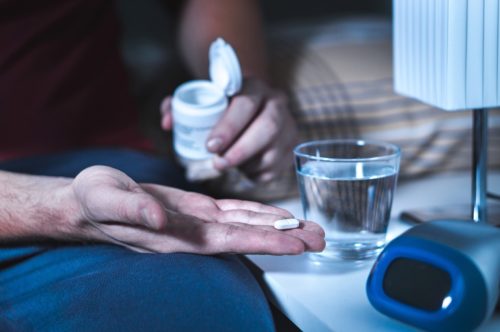[ad_1]
We all know how important it is for us to get those eight hours of sleep every night—but that’s often easier said than done. For one reason or another, you might find yourself tossing and turning instead of being able to wind down. And if that’s the case, your doctor may prescribe you medication to treat your insomnia. Some of these sleep aids are known as “Z-drugs,” and they include eszopiclone (Lunesta), zaleplon (Sonata), and zolpidem (Ambien, Ambien CR, Edluar, and Zolpimist). But while these prescriptions are approved by the U.S. Food and Drug Administration (FDA), they carry a “risk of serious injuries,” which the agency is now warning patients about.
RELATED: FDA Issues New Warning on Hidden Dangers of OTC Pain Relievers: “Stop Right There.”
In a consumer alert posted on March 6, the FDA explained that prescription Z-drugs work by slowing activity in the brain, which can help you fall and stay asleep.
“Quality sleep can have a positive impact on physical and mental health,” the agency said in its alert. “But the treatments also carry the risk—though rare—of serious injuries, and even death.”
This is not the first time the FDA has sounded the alarm on Z-drugs. In April 2019, the agency announced that it would start requiring that certain prescription insomnia medicines include a new “boxed warning” about the potential risks. A boxed warning is the “highest safety-related warning” that the FDA can require medications to include, according to the National Institutes of Health (NIH).
Per the FDA, the additional boxed warning was prompted by reports of serious injuries and deaths that occurred as a result of various complex sleep behaviors after the use of these medicines.
“Complex sleep behaviors occur while you are not fully awake,” the agency explained in its most recent alert. “Examples include sleepwalking, sleep driving, sleep cooking, or taking other medicines.”
The FDA reviewed 66 cases connected to these complex sleep behaviors from Z-drugs, and found 46 reports of non-fatal serious injuries that included “accidental overdoses, falls, burns, near-drowning, exposure to extreme cold temperatures leading to loss of limb or near death, self-injuries such as gunshot wounds and apparent suicide attempts.”
There were also 20 reported deaths from complex sleep behaviors that occurred by “carbon monoxide poisoning, drowning, fatal falls, hypothermia, fatal motor vehicle collisions with the patient driving, and apparent suicide,” according to the agency.
“We have closely watched the safety profile of these drugs since they were approved. When our ongoing safety monitoring recently reflected the risk of more serious injuries and deaths from patients on these medications who experienced complex sleep behaviors, we determined there was a need to take stronger steps to inform the public,” Janet Woodcock, MD, director of the FDA’s Center for Drug Evaluation and Research, said in a 2019 statement. “We’ll continue to monitor and evaluate these risks associated with insomnia medications and communicate with the public or consider further actions, as appropriate.”
About 50 to 70 million people in the U.S. suffer from sleep disorders, with the most common being insomnia, according to the American Sleep Apnea Association. Many of them may be taking Z-drugs to help, especially as health providers have become more concerned about the potential addictiveness of benzodiazepines, another type of prescription sleep aid.
But since the “underlying mechanisms by which these insomnia medicines cause complex sleep behaviors are not completely understood,” the FDA says it is important that patients are aware of the potentially fatal consequences of taking Z-drugs. To help keep yourself safe, read on for the agency’s advice to anyone prescribed these medications.
RELATED: FDA Says Never Take These OTC Medications Before Driving in New Alert.

In total, nearly 30 million zolpidem, eszopiclone, and zaleplon prescriptions were dispensed from U.S. retail pharmacies in 2018, according to the FDA. If you end up being prescribed a Z-drug to help you sleep, the agency said it is crucial that you discuss the benefits and risks of these medicines with your health care provider right off the bat.
“Be sure to read the Patient Medication Guide as soon as you get the prescription filled and before you start taking the medicine,” the FDA advised in its newest alert. “If you have any questions or don’t understand something, ask your health care professional.”
RELATED: These 3 Popular Supplements Can Mess With Your Sleep, Doctor Says.

There is no concrete pattern to how complex sleep behaviors can arise from Z-drugs. According to the FDA, they occur at both high and low doses, as well as after just one dose of these medicines or after a longer duration of treatment. With that in mind, the agency said it is important for patients to carefully follow the specific dosing instructions they were given by their own doctor.
“Use your insomnia medicine exactly as directed,” the FDA cautioned. “To lessen the chances of side effects and adverse events, never take more than prescribed and do not take it more often than prescribed.”
RELATED: Vitamin D Supplement Is Being Recalled—Serious Side Effects Possible, FDA Warns.

If you’ve been prescribed zolpidem, eszopiclone, or zaleplon, there are certain things you need to avoid as well. The FDA said that patients should never take these medicines with any other sleep drugs—and that includes over-the-counter sleep aids you can buy without a prescription, such as melatonin.
At the same time, you shouldn’t drink alcohol before or while taking any Z-drugs.
“Together they may be more likely to cause side effects,” the agency explained.

The FDA advises health care professionals to tell patients they should discontinue the use of their insomnia medication if they experience an episode of complex sleep behavior—even if it didn’t result in any serious injuries.
“Patients should stop taking your insomnia medicine and contact your health care professional right away if you experience a complex sleep behavior where you engage in activities while you are not fully awake or if you do not remember activities you have done while taking the medicine,” the agency said.
Health care professionals are also warned by the FDA to not prescribe eszopiclone, zaleplon, or zolpidem to anyone who has previously experienced complex sleep behaviors after taking any of these Z-drugs.
Best Life offers the most up-to-date information from top experts, new research, and health agencies, but our content is not meant to be a substitute for professional guidance. When it comes to the medication you’re taking or any other health questions you have, always consult your healthcare provider directly.
[ad_2]
Source link

